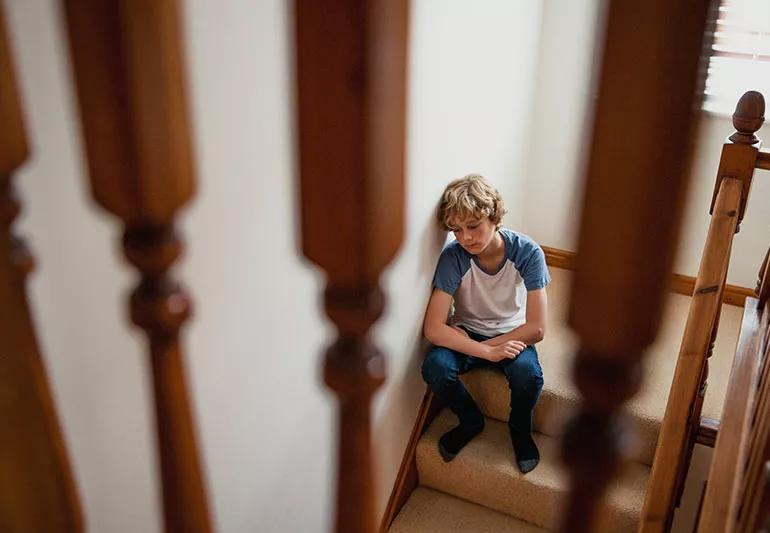Cutting and other forms of self-injury are on the rise among teens

Image content: This image is available to view online.
View image online (https://assets.clevelandclinic.org/transform/7a340871-dc0e-4b7d-8b10-42c782df0068/Self-Harming-916068648-770x533-1_jpg)
Teen sitting alone on staircase
The thought of your child intentionally hurting themselves is devastating and unthinkable. But with self-harm on the rise in teens, it’s important for the adults who love them to know about this sign of psychological distress.
Advertisement
Cleveland Clinic is a non-profit academic medical center. Advertising on our site helps support our mission. We do not endorse non-Cleveland Clinic products or services. Policy
Self-harm is sometimes referred to as “cutting,” but it can take other forms, too, like hair-pulling, scratching and picking at skin. But no matter how it manifests, it’s important that your teen gets the help they need.
Psychologist Kristen Eastman, PsyD, explains what your teen may be experiencing, what signs to look for and what else you need to know to help.
There are many reasons why someone may self-harm, but in short, it’s a misguided way of trying to cope with intense emotions.
“Those who self-harm often experience it as a form of emotional release or a distraction from emotional pain,” Dr. Eastman explains. “Or some may feel emotionally numb and view self-harm as the only way they can feel anything.”
Self-harm can also be a form of communication — a cry for help in the hopes that others will see their pain.
An estimated 15% to 20% of teens self-harm, formally called “non-suicidal self-injury” (NSSI) — injuring oneself while specifically not attempting suicide. But research shows that young people who self-harm are 3.4 times more likely to attempt suicide in the future than their peers who have never engaged in self-harm.
And both are on the rise. “Self-injury and suicide rates have been increasing among adolescents since 2009,” Dr. Eastman says.
Advertisement
Nobody knows for sure why this is, but there are likely a number of contributing factors. Some possible explanations include:
It’s also possible that teenagers are simply reporting self-harm more often than they used to.
Dr. Eastman urges parents to watch out for the following behaviors and signs:
Self-harm leaves marks. Multiple similar marks on your teen’s skin — especially those in close proximity to one another and/or those without a clear explanation — could indicate self-harm, like from:
Teens may attempt to conceal their injuries by refusing to expose certain body parts or covering up in other ways that seem suspicious — like wearing long-sleeved shirts on hot days or wearing an arm full of bracelets that cover their skin.
Stress, anxiety and depression can all cause teens to feel out of control or at a loss for how to cope with these emotions, which can lead to self-harming behaviors.
“Sometimes, self-harm begins after a significant experience or event,” Dr. Eastman says, like rejection from a significant other, arguments with friends, an act of bullying or fallout with a peer group that produces significant distress.
Take heed if your teen takes a sudden or new interest in peers who engage in this behavior or starts watching videos or reading books about self-harm online.
If your teen is shutting themselves off from family and friends and is spending more time alone than seems typical for them, this could indicate depression and, in turn, self-harm.
If you suspect that your teen is self-harming, or if they tell you they are, it’s important not to panic.
What your teen needs now is compassion — and help. Validate their emotions and let them know you understand that they’re feeling overwhelmed. But make it clear that there are better ways to deal with it and you’ll help them figure them out.
The next step is to get your teen some professional help. Look for a mental health professional who has experience treating adolescents who self-harm. If you’re not sure where to start, talk to your pediatrician first.
“It’s distressing to learn that your child has been self-harming,” Dr. Eastman says. “But with your support and a professional’s help, your teen can learn healthier ways of coping with tough emotions.”
To learn more about this topic, listen to the Health Essentials Podcast episode, “The Teen Mental Health Crisis.” New episodes of the Health Essentials Podcast publish every Wednesday.
Advertisement

Delivered every Tuesday!
Sign up for our Health Essentials emails for expert guidance on nutrition, fitness, sleep, skin care and more
Learn more about our editorial process.
Advertisement
The vagina is full of healthy and unhealthy bacteria, so discharge can be normal or problematic
Solutions for real-life scenarios
Tips for keeping the lines of communication open
Identify your triggers, set ground rules for your break and start practicing mindfulness
Reaching menopause very early raises your risk of certain health conditions
Too much screen time and unrealistic expectations and perceptions and can lead to an increased risk of anxiety and depression
Although different conditons, they can occur together or cause one another
Stay merry and bright by knowing your triggers and journaling throughout your visit
Type 2 diabetes isn’t inevitable with these dietary changes
Applying a hot or cold compress can help with pain
Pump up your iron intake with foods like tuna, tofu and turkey